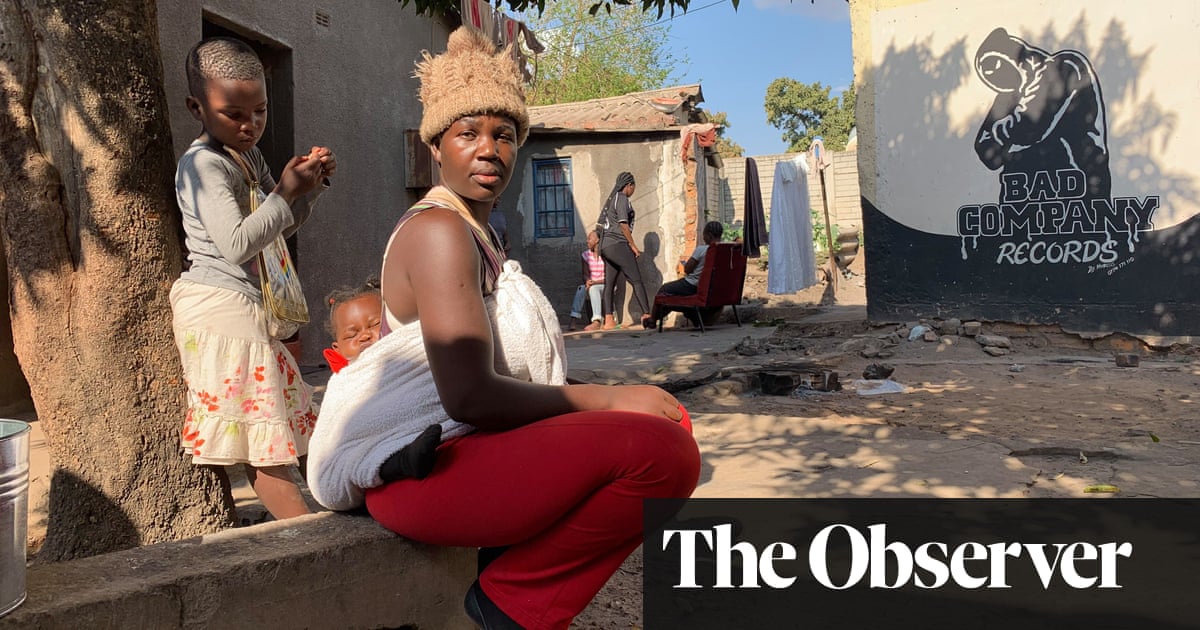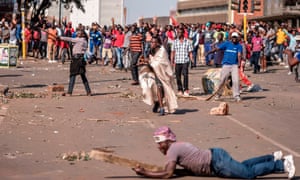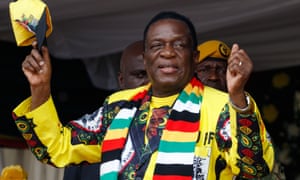Far from seeing reform after Robert Mugabe was toppled, the country has fallen into crisis as millions are reduced to paupers

In the streets of Mbare, the children play, neighbours talk and a wintry sun lights neat houses with carefully tended vegetable plots. But the apparent tranquillity of this poor suburb of Zimbabwes capital hides a rude reality of misery and despair.
The smoke rising into the evening sky is a clue. Power cuts now stretch from dawn to long after dusk. Gas is too expensive so families cook on firewood, gathering around braziers as the sun goes down and an almost total darkness comes.
Another clue is the noise. When more than a dozen families share a single 10 metre by 20 metre courtyard, there is little peace. Through one gate, in one such compound, Rose Mkhomo, 27, nurses her 15-month-old, Brenda. Her neighbour, Maria Peter, 19, is lucky: she has a job in a photocopying shop, though her monthly earnings barely cover two weeks living expenses. Life is hard for everyone now, she said.
It is more than a year and a half since the repressive rule of Robert Mugabe was ended by a military takeover, and a year since the dictators former right-hand man, Emmerson Mnangagwa, took power after a contested election. Mugabe, 95, has been receiving medical treatment in Singapore since April, an official statement revealed last week.
Though there were many sceptics, most in Zimbabwe hoped that the transition would lead to a change in fortunes for the former British colony, battered by decades of misrule.
Mnangagwa promised democratic reform, a wave of new investment and the international rehabilitation of Zimbabwe, a pariah for decades. At rallies, the 77-year-old former spy chief and stalwart of the ruling Zanu-PF party spoke of his country being open for business and promised good days ahead.
Instead, living conditions for millions have deteriorated dramatically. Mkhomos husband earns the equivalent of about 40 a month working in a hospital morgue. The couple pay a monthly rent of 15. A kilogram of sugar is almost 22. Bread is unaffordable. When Mugabe went, we thought things would get better but it has gone from bad to worse, said Mkhomo, who is unemployed.

In recent weeks, the government has imposed austerity measures in an effort to balance the national budget, cutting subsidies of fuel. Mthuli Ncube, the finance minister, has also moved to end the use of multiple currencies, launching a new Zimbabwe dollar. Poor harvests, a cyclone and a drought have compounded problems. The government stopped publishing annual inflation statistics when they reached 175%.
Many others in Mbare and elsewhere are surviving on two meals a day a breakfast of tea and home-baked dough, with spinach and maize meal for dinner.
Only the very wealthy are spared. The hospitals are scenes of desolation. The sick including HIV sufferers lack lifesaving medicine. Savings are now worth a fraction of their value a few months ago. With limited electricity and no demand, companies are laying off staff.
Without power, there is no production, said Isaac Kwesu, chief executive of Zimbabwes Chamber of Mines.
Officials say the problems should be seen as a sign of revival as they implement a programme laid out by the International Monetary Fund.
There are temporary issues as the market adjusts, said Energy Mutodi, the deputy information minister. This is an economy that is transforming into a more robust and innovative one it shouldnt be mistaken for a crisis. We expect prices to stabilise. We are going through a phase where we need to sacrifice and make some savings.
After elections last year there was hope of a bailout from international institutions. Some officials still believe that this may happen, and that the billions in debt run up by Mugabe will be cleared once Zimbabwe shows it has taken the tough medicine that the IMF ordered.
However, western officials have repeatedly made clear to Zimbabwes leaders that financial assistance depends on better governance and political reform. Basically they have to stop doing bad things and start doing some good ones, said one diplomat in Harare.
In August last year, six people were shot dead when the army cleared central Harare at gunpoint following opposition protests at alleged electoral fraud. In January, 12 people died when security forces moved to crush unrest following a fuel price rise. Hundreds were arrested.
Mutodi blamed the violence on hooligans and the main opposition party, the Movement for Democratic Change. He said the government had a duty to uphold the rule of law to show foreign investors that their businesses would be safe.
Some diplomats in Harare say Zimbabwes economic and diplomatic rehabilitation is more distant than ever, and Mnangagwas repeated promises of reform are a deliberate smokescreen.
Weve revised our expectations Now, we are looking at a difficult 10- to 15-year transition to something better, and thats the optimistic scenario, said one.
Others believe the president is a pragmatist who has been thwarted by hardliners in the military and Zanu-PF. They point to incremental changes a move towards allowing full foreign ownership of local businesses, visas for foreign journalists, a relatively free election last year and a new anti-graft commission and say the window for Zimbabwe to end its pariah status is still open.
Its not surprising that a party that has been in control for nearly 40 years is unwilling to take measures that could lead to it losing power and access to financial flows, one said.

There are alternatives to the west and the big international lending institutions, and though these will never provide the funds necessary to refloat the economy and rebuild the country, they might inject enough cash to allow those who hold power to retain it. Powers such as Russia and China are wary, but there are resources to trade platinum, gold, diamonds which are attractive to unscrupulous outfits that thrive in similar environments across the continent.
Some in Zimbabwe continue to make considerable sums of money. The taste for luxury cars among the very wealthy has led to a new genre of social media posts featuring the vehicles driven by MPs, well-connected businessmen and top officials on Harares potholed streets. In the citys wealthy districts, restaurants are still busy and shops offer the latest iPhone.
Outside Harare, by far the largest city, circumstances are different. Expectations of reform are lower, humanitarian need is greater. The United Nations says more than five million people, almost a third of the population and almost entirely in rural areas will be in need of food aid. This year we have more hungry Zimbabweans than ever before, said Eddie Rowie, the World Food Programmes country director.
Obert Masaraure, the leader of a union that represents rural teachers, said his 30,000 members had been reduced to paupers.
The learners are walking to school on empty stomachs. They are collapsing in class because they are so weak. The teachers cant pay for their own childrens education. But people are looting millions, he said.
Mnangagwa and senior officials may have calculated that the recent austerity measures are relatively risk-free. However much anger and despair there might be, there will be no general election for many years, and the opposition is divided.
Protests are planned but few urban Zimbabweans are willing to risk their lives on the streets, and in rural areas the ruling party can use its control of vital seed and fertiliser supplies to quell any unrest. Four-fifths of the economy is informal, with an increasing proportion of transactions depending on barter. Remittances from the vast Zimbabwean diaspora provide a safety net for many but not all.
In Mbare, few see any significant chance of improvement soon. Some day maybe things will get better, said Mkhomo. But not now, I dont think.
Read more: https://www.theguardian.com/world/2019/aug/10/zimbabwe-emmerson-mnangagwa-battle-to-survive


Recent Comments